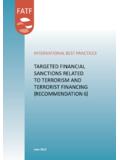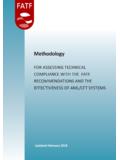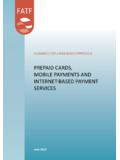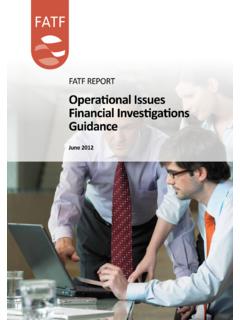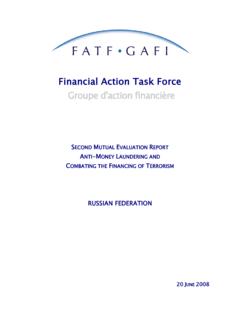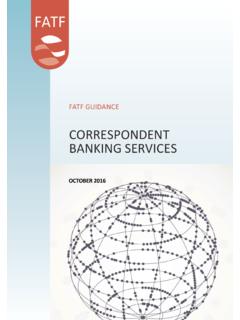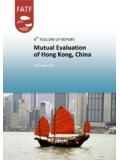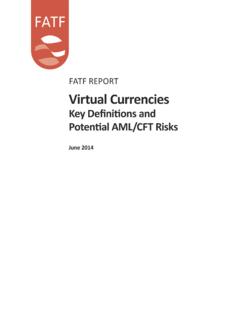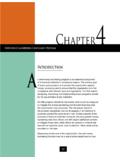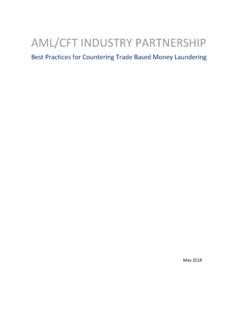Transcription of COMBATING PROLIFERATION FINANCING - FATF …
1 Financial Action Task ForceGroupe d action financi re FATF Report COMBATING PROLIFERATION FINANCING : A STATUS REPORT ON POLICY DEVELOPMENT AND CONSULTATION February 2010 THE FINANCIAL ACTION TASK FORCE (FATF) The Financial Action Task Force (FATF) is an independent inter governmental body that develops and promotes policies to protect the global financial system against money laundering and terrorist FINANCING . Recommendations issued by the FATF define criminal justice and regulatory measures that should be implemented to counter this problem. These Recommendations also include international co operation and preventive measures to be taken by financial institutions and others such as casinos, real estate dealers, lawyers and accountants. The FATF Recommendations are recognised as the global anti money laundering (AML) and counter terrorist FINANCING (CFT) standard. For more information about the FATF, please visit the website: 2010 FATF/OECD.
2 All rights reproduction or translation of this publication may be made without prior written permission. Applications for such permission, for all or part of this publication, should be made to the FATF Secretariat, 2 rue Andr Pascal 75775 Paris Cedex 16, France (fax: +33 1 44 30 61 37 or e mail: contact@fatf ). COMBATING PROLIFERATION FINANCING A Status Report on Policy Development and Consultation February 2010 J TABLE OF CONTENTS I. Introduction .. 4 II. The International Response to PROLIFERATION FINANCING .. 6 The Role of Export Control Systems .. 6 Scope for Financial Measures to Counter PROLIFERATION .. 8 III. Legal Systems .. 9 Definition of PROLIFERATION FINANCING .. 9 Criminalisation of PROLIFERATION FINANCING .. 11 Asset Forfeiture .. 13 Financial Investigation .. 13 International Co-operation: Mutual Legal Assistance and Extradition .. 14 Export Control Systems .. 15 IV. Targeted Financial Sanctions.
3 16 UNSCR 1540 and Targeted Financial Sanctions .. 16 Value of Targeted Financial Sanctions in Counter- PROLIFERATION Efforts .. 16 Ability of Financial Institutions to Implement Targeted Financial Sanctions .. 16 Targeted Financial Sanctions as a Supplement to Export Control Regimes .. 17 Implementation of Targeted Financial Sanctions Against PROLIFERATION Finance .. 17 V. Responsibilities of Financial Institutions .. 18 VI. Channels for Receiving Information from Financial Institutions, including Reporting .. 19 Transaction Screening .. 19 Account Monitoring .. 20 Suspicious Transaction Reporting and Other Forms of Reporting .. 21 The Role of the Competent Authorities .. 22 VII. Awareness and Information Sharing by Jurisdictions .. 23 Awareness and Outreach .. 23 Types of Specific Information .. 25 Mechanisms for Sharing Information .. 26 Information-sharing & Co-operation within Governments .. 28 VIII. Summary of Policy Options for Consideration.
4 29 ANNEX 1 PROJECT TEAM TERMS OF REFERENCE & MEMBERS .. 32 ANNEX 2 TARGETED FINANCIAL SANCTIONS .. 34 ANNEX 3 APPLYING THE RISK-BASED APPROACH TO PROLIFERATION FINANCING .. 38 ANNEX 4 PFPT: SUMMARY OF PRIVATE SECTOR OUTREACH .. 45 2010 FATF/OECD - 3 J COMBATING PROLIFERATION FINANCING A Status Report on Policy Development and Consultation February 2010 I. Introduction 1. The Working Group on Terrorist FINANCING and Money Laundering (WGTM) Project Team on PROLIFERATION FINANCING (PFPT) was created in October 2008 to develop policy options for the WGTM to consider as measures that could be considered in COMBATING PROLIFERATION FINANCING within the framework of existing United Nations Security Council Resolutions (UNSCRs), such as UNSCR 1540(2004), in consideration of the PROLIFERATION FINANCING (PF) Typologies Report1 and national legal frameworks.
5 This work is to build on the Issues for Consideration as outlined in the PF Typologies Report, and be conducted with input from the private sector and other relevant stakeholders (see PFPT Terms of Reference). 2. The PF Typologies Report, adopted by the FATF in June 2008, has formed the starting point for the Project Team's consideration. In particular, the report assembled information needed as a basis for work by the PFPT. The current project has expanded this work through further information-gathering concentrated on information provided by the private sector and export control experts. The analysis of this information has led to further examine and give flesh to the policy options which were sketched in the PF Typologies Report. 3. In particular, the key issues and challenges identified by the PF Typologies Report are: i) legal systems, ii) awareness-raising with both public and private sectors, iii) preventive measures, and iv) investigation and prosecution.
6 4. The PFPT s terms of reference were defined initially as follows: The Project Team will develop policy options for the WGTM to consider as measures that could be considered in COMBATING PROLIFERATION FINANCING within the framework of existing UNSCRs, such as UNSCR 1540(2004), in consideration of the PF Typologies Report and national legal frameworks. This work should build on the Issues for Consideration as outlined in the PF Typologies Report. The Project Team will actively seek input and comments from the private sector and other relevant stakeholders. The Project Team should strive to narrow down the number of options for the full working group (WGTM), but has no mandate to make final decisions; its findings will be fully discussed and considered by the full working group with a view to determining what further steps would be appropriate.
7 To ensure maximum transparency, the Project Team leaders will provide to the Secretariat all documents underlying the team s work (including a team contact list, analysis of research findings and private sector feedback received) for upload to the WGTM secure website. Additionally, the Project Team will update the full working group, including through written summaries, at the February and June 2009 WGTM meetings. Under the leadership of one or two interested delegations, the work of the Project Team will be guided by a project plan, including a timetable for completion of the work. The Project Team will present its final report to the WGTM in October 2009. 1 4 - 2010 FATF/OECD COMBATING PROLIFERATION FINANCING A Status Report on Policy Development and Consultation February 2010 J Box 1: Financial provisions of UNSCR 1540 (2004): 2.
8 Decides also that all States, in accordance with their national procedures, shall adopt and enforce appropriate effective laws which prohibit any non-State actor to manufacture, acquire, possess, develop, transport, transfer or use nuclear, chemical or biological weapons and their means of delivery, in particular for terrorist purposes, as well as attempts to engage in any of the foregoing activities, participate in them as an accomplice, assist or finance them; 3. Decides also that all States shall take and enforce effective measures to establish domestic controls to prevent the PROLIFERATION of nuclear, chemical, or biological weapons and their means of delivery, including by establishing appropriate controls over related materials and to this end shall: (d) Establish, develop, review and maintain appropriate effective national export and trans shipment controls over such items, including appropriate laws and regulations to control export, transit, trans-shipment and re-export and controls on providing funds and services relate to such export and trans-shipment such as FINANCING , and transporting that would contribute to PROLIFERATION , as well as establishing end-user controls; and establishing and enforcing appropriate criminal or civil penalties for violations of such export control laws and regulations; 5.
9 The Project Team's mandate derives from UNSCR 1540 and the framework of UNSCRs that are relevant to a consideration of PROLIFERATION FINANCING . The Project Team has concentrated on the obligations required by UNSCR 1540, and has highlighted where policy options relate directly to those obligations. We have looked at the scope of UNSCR 1540 in a broad perspective. This report therefore also considers counter PROLIFERATION FINANCING in the wider context of international Conventions, Treaties and Security Council Resolutions. 6. In addition to UNSCR 1540, a number of other UNSCRs can have some relevance, including UNSCR 1673(2006); and 1810(2008) on non- PROLIFERATION in general; and resolutions related to specific countries of PROLIFERATION concern, such as UNSCRs 1695(2006); 1718(2006); and 1874(2009) on North Korea; and UNSCRs 1737(2006); 1747(2007); and 1803(2008) on Iran will be relevant where applicable.
10 Previous consideration of these resolutions by the FATF has produced guidance which remains relevant in the context of the specific PROLIFERATION risks covered by these UNSCRs, in particular the guidance produced by the FATF in relation to UNSCRs 1718, 1737 and 1803. However, the requirements of UNSCRs 1737 and 1803 differ from those of UNSCR 1540, so the guidance will not read-across to PROLIFERATION finance in general. 7. There is at present no standard, universal definition of PROLIFERATION or PROLIFERATION FINANCING common to the relevant international regimes and fora. The broad working definition used in the PF Typologies Report was the initial basis for the work of the Project Team. Based on the latter definition, the Project Team has proposed the following revised definition of PROLIFERATION FINANCING for FATF purposes as set out in Section III below: " PROLIFERATION FINANCING " refers to: the act of providing funds or financial services which are used, in whole or in part, for the manufacture, acquisition, possession, development, export, trans-shipment, brokering, transport, transfer, stockpiling or use of nuclear, chemical or biological weapons and their means of delivery and related materials (including both technologies and dual use goods used for non-legitimate purposes), in contravention of national laws or, where applicable, international obligations2.
